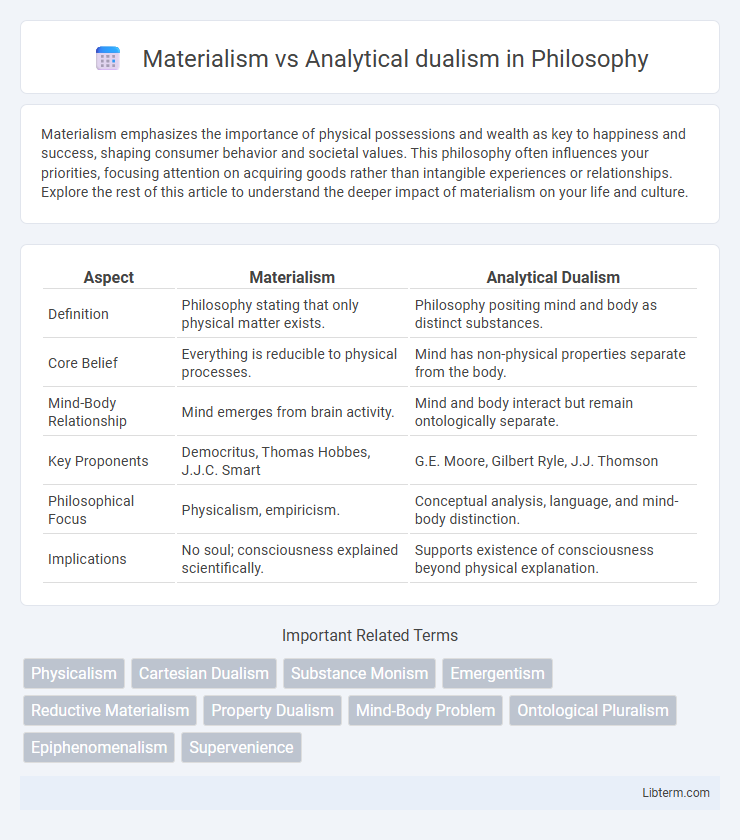Materialism emphasizes the importance of physical possessions and wealth as key to happiness and success, shaping consumer behavior and societal values. This philosophy often influences your priorities, focusing attention on acquiring goods rather than intangible experiences or relationships. Explore the rest of this article to understand the deeper impact of materialism on your life and culture.
Table of Comparison
| Aspect | Materialism | Analytical Dualism |
|---|---|---|
| Definition | Philosophy stating that only physical matter exists. | Philosophy positing mind and body as distinct substances. |
| Core Belief | Everything is reducible to physical processes. | Mind has non-physical properties separate from the body. |
| Mind-Body Relationship | Mind emerges from brain activity. | Mind and body interact but remain ontologically separate. |
| Key Proponents | Democritus, Thomas Hobbes, J.J.C. Smart | G.E. Moore, Gilbert Ryle, J.J. Thomson |
| Philosophical Focus | Physicalism, empiricism. | Conceptual analysis, language, and mind-body distinction. |
| Implications | No soul; consciousness explained scientifically. | Supports existence of consciousness beyond physical explanation. |
Understanding Materialism: Core Principles
Materialism asserts that all phenomena, including mental states and consciousness, arise solely from physical matter and its interactions, rejecting any non-physical substances. Core principles emphasize that the brain's neurobiological processes fully account for thoughts, emotions, and experiences, eliminating the need for a separate, immaterial mind. This view contrasts with analytical dualism, which posits a fundamental distinction between physical bodies and non-physical minds or consciousness.
Defining Analytical Dualism: Key Concepts
Analytical dualism defines the mind and body as distinct entities, emphasizing the irreducibility of conscious experience to physical processes. Key concepts include the ontological separation of mental states from neural activity and the assertion that subjective consciousness cannot be fully explained by materialism. This framework challenges physicalist accounts by positing mental phenomena as fundamental components of reality alongside physical substances.
Historical Origins of Materialism and Analytical Dualism
Materialism traces its historical origins to ancient Greek philosophers like Democritus and Epicurus, who proposed that reality consists solely of physical matter and that all phenomena, including consciousness, can be explained by material interactions. Analytical dualism emerged more recently within 20th-century philosophy of mind, primarily through the work of Gilbert Ryle and John Foster, who addressed the mind-body problem by distinguishing mental states as non-physical yet closely linked to physical processes. While materialism roots itself in empiricism and scientific naturalism, analytical dualism relies on rigorous conceptual analysis to defend the irreducibility of mental phenomena to purely material explanations.
Major Philosophers and Theories
Materialism, championed by philosophers like Thomas Hobbes and contemporary thinkers such as Daniel Dennett, posits that only physical matter exists and that consciousness emerges from brain processes. Analytical dualism, advanced by figures like David Chalmers and Alvin Plantinga, argues for the ontological distinction between mind and body, emphasizing the irreducibility of consciousness to physical explanations. The interactionist model of Descartes contrasts with materialist monism, while Chalmers' "hard problem of consciousness" highlights challenges in explaining subjective experience through materialist frameworks.
Mind-Body Problem: Materialist vs. Dualist Perspectives
Materialism asserts that the mind is entirely a product of physical processes within the brain, emphasizing neural activity and biochemical interactions as the basis of consciousness. Analytical dualism, rooted in philosophers like Descartes, posits that mind and body are fundamentally distinct substances, with mental phenomena irreducible to physical explanations. The mind-body problem centralizes this debate, questioning whether subjective experiences can be fully explained by material processes or require a dualistic approach to account for consciousness.
Scientific Evidence and Critiques
Materialism asserts that consciousness arises solely from physical processes in the brain, supported by extensive neuroscientific evidence showing correlations between neural activity and mental states. Analytical dualism posits that mind and body are distinct, arguing that subjective experience cannot be fully explained by physical phenomena, a stance challenged by the lack of empirical evidence for non-physical substances. Scientific critiques highlight that while materialism aligns with empirical observations and advances in neurobiology, analytical dualism struggles to provide testable hypotheses, limiting its acceptance in contemporary cognitive science.
Implications for Consciousness Studies
Materialism posits that consciousness emerges solely from physical brain processes, emphasizing neural correlates and brain activity patterns. Analytical dualism asserts that mental states and consciousness cannot be fully explained by physical components, highlighting the irreducibility of subjective experience and qualia. These contrasting views influence methodologies in consciousness studies, shaping debates on the mind-brain relationship and the potential for artificial consciousness.
Ethics and Morality in Materialism and Dualism
Materialism grounds ethics and morality in physical processes, asserting that moral values emerge from brain function, evolutionary biology, and social conditioning without invoking non-physical elements. Analytical dualism posits the existence of both physical and non-physical substances, leading to ethical frameworks that incorporate mind-body interaction and often emphasize moral responsibility beyond material causes. The divergence influences debates on free will, moral accountability, and the ontological basis of values, with materialism favoring naturalistic explanations and dualism allowing for metaphysical dimensions in ethical theory.
Contemporary Debates and Applications
Contemporary debates in philosophy of mind emphasize the contrast between materialism, which asserts that consciousness and mental states arise solely from physical processes, and analytical dualism, which argues for the irreducibility of mental phenomena to physical explanations. Advancements in neuroscience and cognitive science fuel materialist perspectives by mapping brain activity to mental function, while analytical dualism finds support in persistent challenges like explaining subjective experience or qualia. These debates heavily influence applications in artificial intelligence, where materialism underpins efforts to replicate consciousness computationally, whereas analytical dualism raises questions about the limits of machine understanding.
Future Directions in Philosophy of Mind
Future directions in the philosophy of mind focus on integrating neuroscientific findings with materialism to better explain consciousness through physical processes, while analytical dualism seeks to refine the conceptual framework distinguishing mental and physical properties. Advances in cognitive science and artificial intelligence challenge materialist reductionism, prompting dualists to explore non-physicalist models of mind-body interaction. Emerging interdisciplinary research emphasizes novel ontologies that transcend the traditional materialism-dualism dichotomy, aiming to reconcile subjective experience with empirical data.
Materialism Infographic

 libterm.com
libterm.com